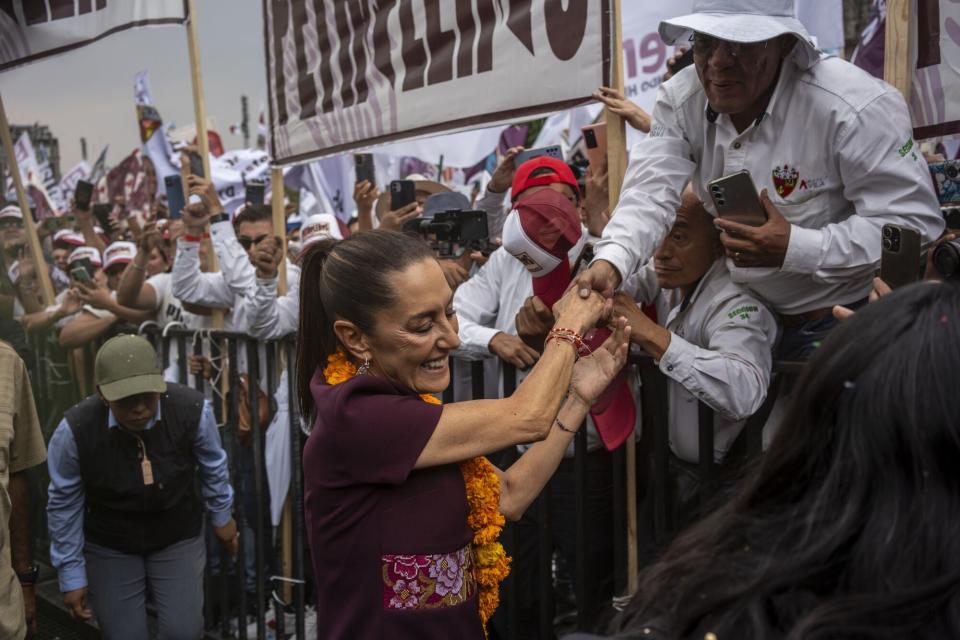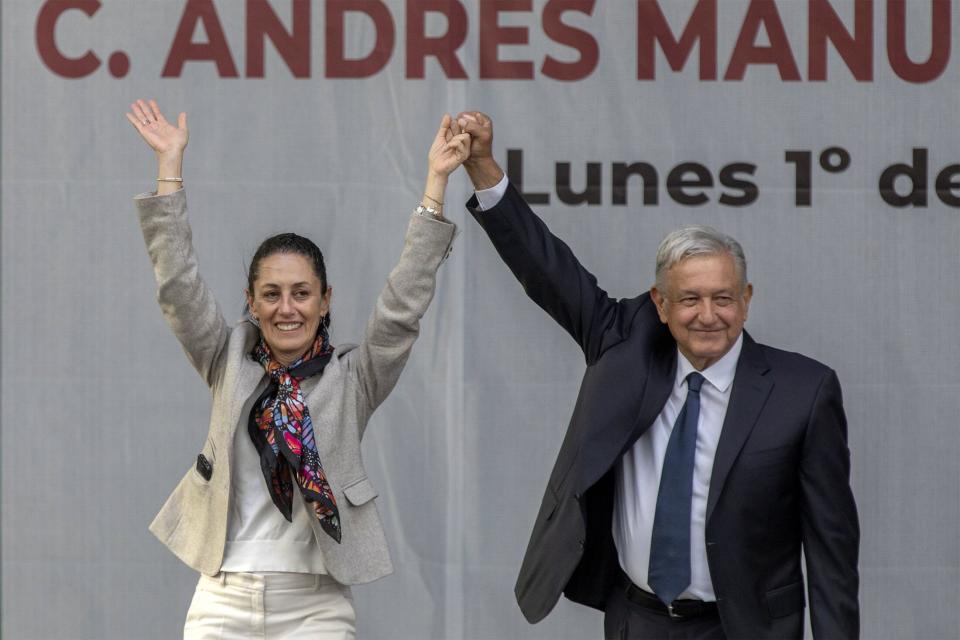For Sheinbaum, Rise and Fall of Rousseff Is a Cautionary Tale
(Bloomberg) -- Picture this: A highly popular president who can’t run for reelection seeks to cement his legacy by anointing a more technocratic female successor to become the country’s first woman president. That describes the rise of Mexico’s Claudia Sheinbaum in a nutshell.
Most Read from Bloomberg
Key Engines of US Consumer Spending Are Losing Steam All at Once
Homebuyers Are Starting to Revolt Over Steep Prices Across US
Mnuchin Chases Wall Street Glory With His War Chest of Foreign Money
Oil Swings After OPEC+ Signals Plan to Return Barrels to Market
The same was said about Dilma Rousseff when she reached Brazil’s highest office in 2010 after Luiz Inacio Lula da Silva’s eight successful years in office. Today it’s Sheinbaum who is expected to ride President Andres Manuel Lopez Obrador’s coattails to victory in Sunday’s election.
The Sheinbaum-Rousseff parallels are largely a product of the striking similarities between Lula and AMLO. Both crafted their political identities as voices of the poor and working classes, both finally won election on their third attempts, and eventually arrived at the end of their presidencies having built a unique brand around their personality.
These two populist leaders in Latin America’s two biggest economies acted as mentors to female proteges — Rousseff, 76, is an economist and former revolutionary. Sheinbaum, 61, is a scientist and one-time student activist.
“They’re both seen as less charismatic and more technical in terms of their training,” said Anya Prusa, an associate partner and Brazil analyst at the Albright Stonebridge Group in Washington. “Those are the challenges that, if you look at both women, they have had to overcome.”
That’s where the analogies end as Rousseff’s presidential career ended in disgrace while Sheinbaum’s hasn’t even begun. The rise and fall of Brazil’s only female president does show how even the best-laid succession plans can go wrong. She ultimately failed to live up to the high expectations Lula had set, lacking his political instincts or shrewdness.
What may ultimately shape the trajectory of the aspiring Mexican leader are the crucial differences not only between the two women but also the countries they represent.
The fractured nature of Brazil’s congress, which is made up of members of nearly 20 parties, meant Rousseff always relied on an unstable governing coalition — one that proved difficult to keep in line once the economy and her approval rating began to nosedive.
In Mexico, however, the Morena party AMLO created quickly became the dominant force in local politics, with the ruling coalition currently controlling both houses of the legislature.
Even as Mexico’s economy has shown signs of sluggishness near the end of AMLO’s term, Sheinbaum is unlikely to face such a steep challenge from lawmakers: Morena is entering the weekend elections seeking to win supermajorities in both the lower house and Senate. That would give it a level of control over the federal government, including the power to force through constitutional changes, that even AMLO never enjoyed.
“Sheinbaum may not have a big problem with governability, and will have the support she needs,” said Valentina Sader, deputy director and Brazil lead at the Atlantic Council. “Congress may be an obstacle on bigger projects like constitutional reforms, but not so much on a day-to-day governing basis. The difference in terms of what Congress might look like may be defining.”
Read More: AMLO Successor to Inherit Slowing Economy as Mexico Spark Fades
Brazilian analysts, meanwhile, have long attributed many of Rousseff’s problems to her lack of governing experience. A former anti-dictatorship activist, she had served as Lula’s chief of staff and energy minister. But she had never held elected office before taking power in Latin America’s most populous nation.
Sheinbaum, by contrast, served as the mayor of a borough of Mexico City home to roughly 700,000 people. She then became the first woman elected to lead Mexico City itself, a position that put her in charge of one of the planet’s largest metropolises.
“She has a depth of political experience that Dilma did not,” Prusa said. “Dilma had held cabinet positions but she was not political, and once the economy went south she did not have the skill or the alliances — or even the recognition that she needed alliances — to deal with that.”
Read More: The 10 Challenges Mexico’s Next President Will Face: QuickTake
None of that means Sheinbaum is in for an easy ride. Mexico’s ongoing public security crisis, its uncertain economy, and need for deep fiscal and other reforms will all pose risks to the country’s next president from day one. She is likely to face pressure from inside Morena over the direction of her government, especially if she seeks to stray from the policies that made AMLO successful.
One of the biggest open questions is what role AMLO will play once his presidency ends. Lula largely receded to the background after leaving office, serving more as an informal adviser to Rousseff until he reemerged publicly — as a target of corruption allegations — in her final days.
Lula, of course, is now back. The Mexican constitution bans presidents from running again — so that option is off the table for AMLO. He has pledged to leave politics behind altogether, but there are doubts he will abandon the spotlight so easily.
That leaves Sheinbaum with the burden of being a female president in a continent where misogyny remains as a key issue despite recent progress.
“She’ll be judged as a woman no matter what,” Prusa said of Sheinbaum, in case she gets elected. “Dilma made plenty of mistakes, but I think the consequences were harsher because she was a woman.”
Most Read from Bloomberg Businessweek
Disney Is Banking On Sequels to Help Get Pixar Back on Track
Israel Seeks Underground Secrets by Tracking Cosmic Particles
How Rage, Boredom and WallStreetBets Created a New Generation of Young American Traders
US Malls Avoid Death Spiral With Help of Japanese Video Arcades
©2024 Bloomberg L.P.






